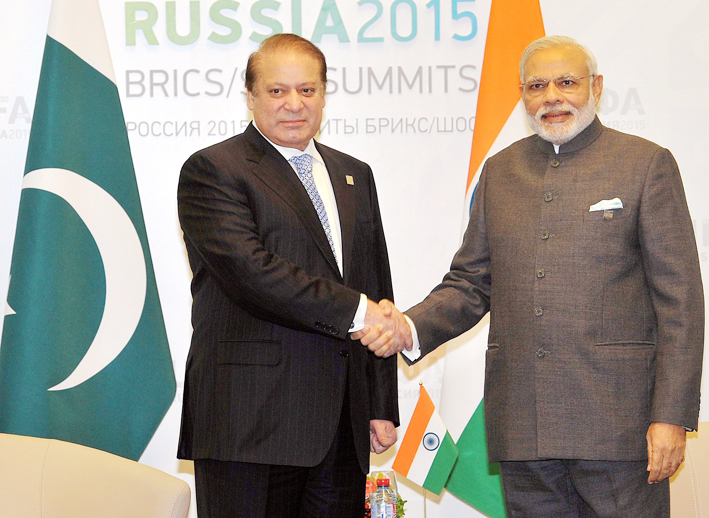
Prime Minister Narendra Modi’s meeting with his Pakistani counterpart on the sidelines of the SCO Summit was important for a number of reasons. First of all, it was the first one-on-one meeting in over a year; the last time the prime ministers met was on the sidelines of Modi’s swearing in May 2014. While the two did exchange a few words at the SAARC Summit retreat last year, their overall body language was not particularly convincing.
Since the SAARC Summit, however, the Indian prime minister has made some overtures: he called Sharif in the aftermath of the Peshawar attack in December 2014, sent him birthday wishes, and spoke to him again on the eve of the Cricket World Cup. Indian foreign secretary, S Jaishankar had also visited Islamabad and met with his counterpart, as well as the Nzwaz Sharif. Modi called Sharif on the occasion of Ramazan and announced the release of Pakistani fishermen as a goodwill gesture. This conversation was important because it helped in reducing tensions between both sides. In the aftermath of Indian army’s raid on militants’ camps along the border with Myanmar, Rajyavardhan Singh Rathore a Minister of State for Information and Broadcasting lauded the action, while also stating that this action should serve as a warning to India’s neighbours. Pakistan’s Interior Minister Chaudhry Nisar Ali Khan, however, was quick to respond stating that Pakistan was not Myanmar and that “Indian leaders should stop day dreaming.”
Bilateral meetings on the sidelines of multi-laterals are a good idea, especially in the context of India and Pakistan ties, since they are away from the media glare and they give leaders a chance to keep communication open when official dialogue is suspended. Modi’s predecessors, Dr. Manmohan Singh and Atal Bihari Vajpayee, made it a point to utilize these meetings so that even if official dialogue were not on, they could keep channels open.
Certain meetings have been especially important because they paved the way for reviving engagement at times when tensions between both governments seemed to be rising – for example, Vajpayee’s September 1998 meeting with Sharif on the sidelines of the United Nations General Assembly (UNGA) in the aftermath of nuclear tests by both countries. Similarly, Dr. Manmohan Singh met General Pervez Musharraf on the sidelines of the UNGA, as well as President Asif Ali Zardari. It would be pertinent to point out that the Sharm-El-Sheikh meeting with then-Prime Minister Yousaf Raza Gilani turned out to be an unmitigated disaster for Dr. Singh, due to some provisions of the joint statement: first, the fact that India agreed to delink the composite dialogue process from terrorism, and second, the inclusion of Balochistan in the joint statement. The meeting was held only eight months after the Mumbai attacks, and Dr. Singh received severe criticism for having weakened India’s case vis-à-vis Pakistan.
If one were to look at the specifics of the recent meeting between Sharif and Modi, as expected, both sides took up a few issues. India raised the issues of the release of Zakiur Rehman Lakhvi as well as the expedition of 26/11 trials. The most important outcome, however, was Modi’s acceptance of the Pakistani prime minister’s invitation to attend the SAARC Summit in Pakistan.
This is important, because without specifically going to Pakistan for a bilateral, Modi will actually get a chance to engage at a comprehensive level with the Pakistani leadership. An important thaw in 2004 was driven by Vajpayee’s visit to Islamabad for the SAARC Summit. An important outcome of this was the Islamabad Declaration, where SAARC countries – including Pakistan – gave an assurance that they would take a firm stand against terrorism.
During the Sharif-Modi meeting, was also decided that the NSA’s of both countries would meet. A joint statement issued listed the points had been agreed during the bilateral between Modi and Sharif including: NSA’s of both countries would meet to discuss “all issues connected to terrorism;” DGMO’s and border security chiefs would interact; the release of fishermen; the expedition of the 26/11 trial; and the facilitation of religious tourism.
It would be pertinent to mention that PM Sharif has drawn considerable flak for not mentioning the Kashmir issue during this meeting. It is perhaps for this reason that Pakistani NSA Sartaj Aziz, who was present during the prime ministers’ meeting in Russia, did a u-turn while speaking to reporters in Islamabad on Tuesday. Aziz stated that no dialogue process with India could exclude the Kashmir issue and that Pakistan will “not compromise” on its honour and dignity. He also stated that in order to expedite trials against the 26/11 accused Pakistan needs more evidence.
Opposition parties were critical of Modi’s decision to meet Sharif. The Congress Party which had faced criticism from the BJP was especially critical of Modi’s decision to accept Sharif’s invitation to attend the SAARC Summit at a time when two security personnel (one of the army and another of the BSF) had been killed in ceasefire violations. Even BJP’s ally Shiv Sena criticized the Prime Minister for his meeting with his Pakistani counterpart, Sharif.
What really remains to be seen is how the Pakistani army reacts to this meeting. Skeptics in India argue that it is Rawalpindi which calls the shots and it is too early to expect any real progress on the ground. Some analysts feel Modi has sent a firm message to Pakistan: that terrorism is the primary issue and economic engagement between both countries will be largely under the SAARC framework and not bilaterally.
In conclusion, while the Modi-Sharif meeting on the sidelines of SCO is a welcome beginning it remains to be seen whether the leaderships of both countries will be able to withstand domestic pressures and make substantial progress.
***
Image: Manvender Vashist, Flickr


